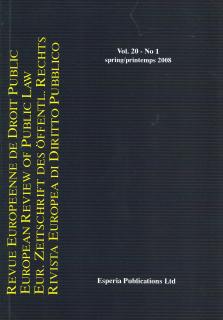
European Security: The Netherlands
Flora Goudappel
Associate Professor, Department of European Union Law, School of Law, Erasmus University Rotterdam
European competences in the field of security are scattered among the three pillars. The long-standing debate on majority voting instead of unanimity rule in decision-making takes on a fresh and added value. The nature of possible measures in the field of a CFSP is different from the nature of the other two pillars; solidarity between the Member States is therefore a natural requirement of the second pillar. Similarly, not all competences and possibilities under the third pillar are natural candidates for any form of majority voting. The most important problems for the present-day system lay in concerns about the democratic accountability of such decisions. To complete the picture, security issues under the first pillar need to be discussed as well. Hence, the legal basis of the anti-terrorism measures is not clear-cut in the European Union law: the second and the third pillar both play a role, while the first pillar has been used as a legal basis in specific instances as well. Closely linked to the pillar structure problems for European security is the choice of legal instrument. For the Dutch government, there has never been any doubt about implementing European legislation on European security issues in the national legal system. As is clear from, for instance, the Dutch participation in Schengen and Prüm and the Dutch initiative for the Hague Programme, the Netherlands tends to be on the forefront of developments in this respect. Cross-border co-operation does not imply any constitutional changes in the Dutch system, most notably because direct effect of European Union law has never met any resistance in the Dutch legal system, while even constitutional obstacles present in the constitutional systems of other Member States do not exist anymore in the Dutch constitutional system. Early participation in all aspects of European security has meant that national infrastructures have gradually been adapted to the European requirements.





















